|
Chapter One: Jus Ad Bellum (Late July 1944) Intelligence Briefing prepared for the Qing Emperor My Dear Emperor, The syndicalists have given us a great gift with their new “War Council” which was established at the recently concluded Chicago conference. The War Council is a body of three representatives, one each from the three Red continents: the African Union, the European Union and the Organization of American Syndicates. At least two of the three members of the War Council must approve any offensive war by any Internationale member state. The foolish Americans evidently spearheaded the development of this system in order to appease the weak African states’ demands that they have a say in matters of war. Any rational observer knows that America and France are the true powers in the socialist alliance, but they seem intent on sharing power, or at least an illusion of it, with their client states. What it does mean is that there is now ample opportunity for us to predict Internationale war plans if we can infiltrate the continental organizations. The War Council last week delivered a heavily redacted announcement that they had unanimously approved a declaration of war on a state that would remain secret for purposes of operational security.  Naturally, we endeavored to discover if China or any of our neighbors were the target of this declaration. Based on the evidence, we believe that the syndicalists intend to attack the Carlists in Spain.  The War Council is a controversial proposal and so many within the socialist alliance and without are curious to see how it will work. The Carlists, occupying territory that the Internationale regards as belonging rightfully to the F.A.I., represent the most unifying and noncontroversial choice for a “test run” of this new system. The Internationale concerns itself mainly with the opinion of its own peoples and the handful of friendly non-member states, such as the Netherlands, and the Dutch public does not hold the Carlist regime in high regard. Furthermore, the French have been accused by F.A.I. sympathizers throughout the Internationale of abandoning the F.A.I. in their initial revolt. Barcelona, the epicenter of that revolt, has almost holy status amongst many socialists, and so its liberation will undoubtedly be celebrated by many who are normally critical of Internationale foreign policy.  Our evidence for making this determination is not merely circumstantial. Wings of bombers that were due to arrive back in America from Europe never arrived, leading us to believe they were redeployed to another location in Europe.   The American battleship fleet is currently anchored in Bordeaux. An agent in the Poitou region also reported a gathering of landing craft and seeing the Revolutionary Marines manning the port. This could be preparation for an attack on Spain’s northern coast.  Sources in the French railworkers’ union have reported a large amount of heavy equipment being shipped towards the Spanish border.  It has been difficult for us to find all of the American infantry divisions with the chaos of redeployment and returns, but we do know that there are far too many in southern Spain than simple defensive purposes would justify.  The syndicalists’ victory is assured, but any changes in their conduct of war will be of interest to us. Chairman Gitlow at the Chicago conference declared an end to total war, and our spies in the American military have provided us with new manuals that suggest the military is shifting towards stricter rules of engagement with an eye towards reducing civilian casualties. We believe the hope here is to prevent angering local populations when a nation is invaded.  This drive towards the fool’s errand of a “humanitarian war” would seem to incentivize fast wars that end neatly. Overwhelming force is the ally of the Internationale in this scenario, as it would theoretically awe the enemy into submission without requiring a protracted and bloody conflict.  We can also expect the Internationale to utilize amphibious landings and mobile forces to try and end conflicts as quickly as possible by overwhelming an inferior enemy from multiple directions.   Our general staff estimates that the Internationale should be able to conquer the Carlist territory in under a month.  The Internationale’s next military goals are a mystery. France’s relationship with the Netherlands suggests that they are attempting to use diplomacy to woo non-socialist states into the orbit of the European Union rather than force, and so other than stomping out the Carlists who control territory regarded as F.A.I. territory, it does not seem as though force will be used to consolidate the Internationale’s hold on Europe. It remains to be seen what the War Council will and will not approve in the future, but the inherent flaws in the operational security of such a body will hopefully give us ample opportunity to know about their moves in time to react. Your Loyal Servant, Colonel Long Feng ~*~*~*~ President Quezon Casts Doubt On Internationale’s “Just War” Manila Bulletin, July 28, 1944 The Internationale’s defeat of the Carlists in six days was welcomed in America and Europe as a sign that the Internationale could carry out swift and devastating “security operations” with a minimum of loss of life. President Quezon, when asked about the operation by our own reporters today, cast doubt on optimistic claims by syndicalists that the Internationale could effectively police the globe while avoiding the horrors of past wars. 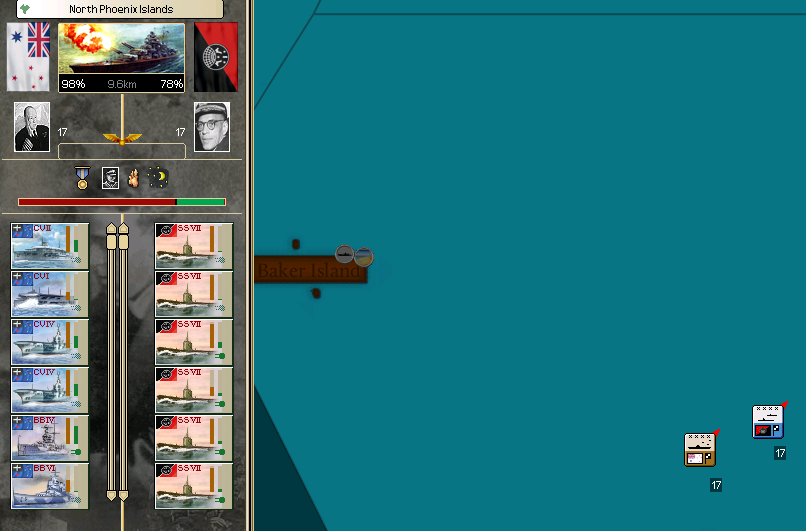 “The Americans picked their test target well with the Carlists. The population in the north of Spain was battered and exhausted and desperate for any kind of aid. It was no wonder that the Carlist state collapsed as quietly as it did. I imagine they will find further adventures much more complex. Take, for instance, Australasia.”  “The Americans can bring to bear a grand army on a neighbor of their closest ally and defeat them soundly by attacking from three separate directions. But their war with the Australasians has dragged on since 1940. What is swift and just about the naval war in the South Pacific? The Americans seek to sink every boat bringing supplies to Australasia, to starve them out and make them desperate. That seems every bit as brutal as the European war to me.” 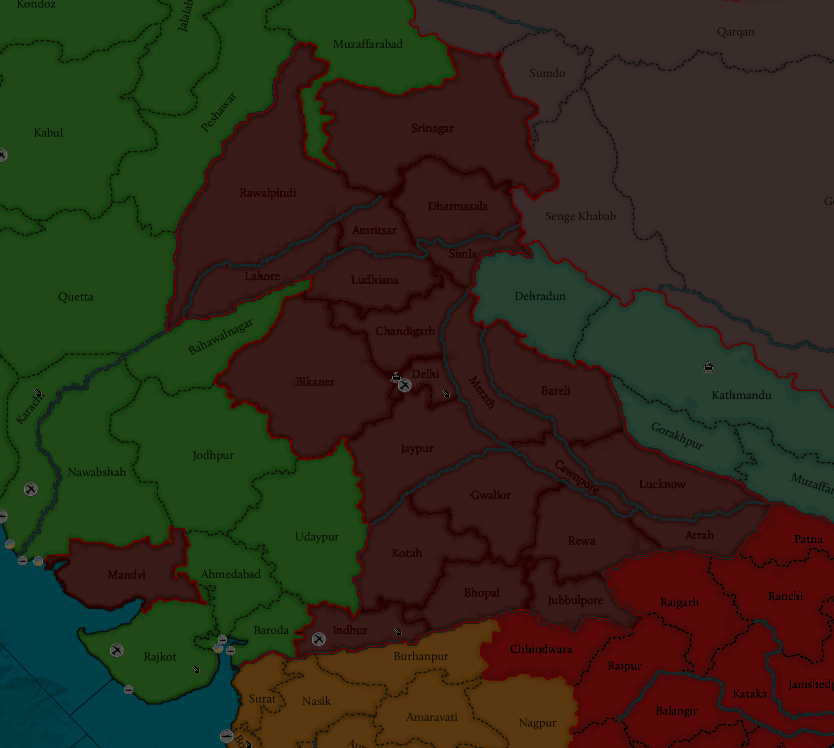 When asked to respond to socialist leader Luis Taruc’s demand that the Philippines support the “just international cause” represented by the Internationale, President Quezon pointed out that the Internationale was happy to let its enemy Delhi fall to a Turkestani regime that he referred to as “barbaric” rather than intervene to spare the population their fate. The President clearly does not believe that the new great powers will be any better than the old.
|
|
|
|

|
| # ? Apr 26, 2024 19:08 |
|
Six days, oof, that's a loving curbstomp. I mean, it *is* the might of three continents versus Just North Spain, but...
|
|
|
|
Can't even call that a war, more like a weeklong getaway.
|
|
|
Freudian posted:Six days, oof, that's a loving curbstomp. I mean, it *is* the might of three continents versus Just North Spain, but... Primarily it's that motorized units just go really fast when they're not impeded - and, well, if you'll look at how the war started, you'll notice that the Carlist AI has stuck all of its divisions at the border to the CNT-FAI, leaving the French border and the coastal provinces woefully unprotected. Makes snapping up the VP provinces pretty easy when your divisions go like three times the speed of the regular infantry and militia divisions the Carlists probably are mostly using.
|
|
|
|
|
With Delhi out of the picture our endgame just got a lot clearer.
|
|
|
|
Australia looks like it might be a tough nut to crack! ... Do we have nukes yet?
|
|
|
|
paragon1 posted:Australia looks like it might be a tough nut to crack! It's a trick; the emu's will only be made stronger by this action.
|
|
|
|
Chief Savage Man posted:I wonder if a lot of the elaborate and intertwined event chains could be replaced by the National Goals system. I'm not a hundred percent sure on how it works though but what I'm imagining is awesome. Man reading this thread's old posts and stuff didn't age well (so loving glad decisions are coming back in waking the tiger)
|
|
|
|
Heya, just caught up with this entire thread over the last weekend. As an Australian, I've only one request: gently caress Australasia up good.
|
|
|
|
Synthbuttrange posted:Heya, just caught up with this entire thread over the last weekend.
|
|
|
|
Chapter Two: So Long, It’s Been Good to Know You (Early August 1944)quote:INTERNATIONALE WAR COUNCIL BUSINESS – TOP SECRET 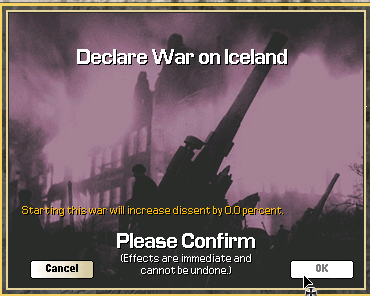 quote:INTERNATIONALE WAR COUNCIL BUSINESS – TOP SECRET Sandra woke up too early and could not get back to sleep. She could use the extra rest but the last time she had fallen back asleep after getting up too early she had slept too late and missed the beginning of her watch. She couldn’t afford to do that again, not with how much she’d been messing up. So, Sandra decided she’d go relieve whoever was on watch early. It was the safe thing to do. She could probably get away with napping in the tower anyway. Nobody was really inspecting the watches anymore. The sun wasn’t up just yet, and it was plenty dark. The camp was mostly asleep, the only noise coming from the winds coming in from the Channel and the occasional noise of a truck rumbling towards Cherbourg. A few silhouettes moved about patrolling the camp. A few lit cigarettes could be seen atop the watchtowers, one of a million ways this postwar army ignored security concerns. This was Normandy after all. It’s not like there were any French partisans ready to snipe an American. Sandra approached the ladder to the watchtower. The person on watch was supposed to have seen her by now and called out the challenge. They didn’t. Sandra climbed on up anyway. When she poked her head into the watchtower, she saw a man sitting with a guitar, so dimly lit that Sandra could hardly even tell the color of his skin. “You’re early, comrade.” the man said. Sandra explained her reasoning for coming early. “Well, if it’s nothing to you, miss, then I’d like to sit out my watch.” Sandra didn’t question the man, and instead she just ambled over to the side and looked out over the camp and the Channel in the distance. Another watch began. The man spoke up. “I don’t think we’ve met. What’s your name?” “Sandra.” “That’s a fine name. How old are you, Sandra?” “Twenty.” she lied. Her face was illuminated by the moon, while he sat with his back to it. He studied her face for a moment. Nobody ever seemed convinced by the fake age (it was really seventeen), but this man, like most people, didn’t challenge her on it. He looked back at his guitar and began strumming it again. “How’d you end up in the army? Drafted?” “Volunteered.” “Really? How come?” “That ain’t interesting.” He stopped strumming and looked up at her, his gaunt features clearer than before. “You volunteered to go to war, Sandra. To die for something, if you ordered to. That’s a decision that can’t help but be interesting.” Hearing his words hurt her. She had volunteered rashly, to stick it to her mother who told her she had to deal with the horrible people at the factory because the war effort was too important to worry about what she wanted. So, she had lied about her age and joined up, just to get away. And now she was here, just taking up space and resources. Not fighting at all. Doing busywork. “I… wanted to show the boys that us girls were tough enough, that fighting ain’t just for the boys.” She stole this line from a propaganda poster back home that exhorted young women to enlist. The slightest of smiles creeped onto the man’s face. “If a boy can’t see that the girls are tough enough, then it’s because he don’t wanna see. I take it you ain’t seen much fighting? You don’t look like you have.” “None.” she admitted, with a note of embarrassment. 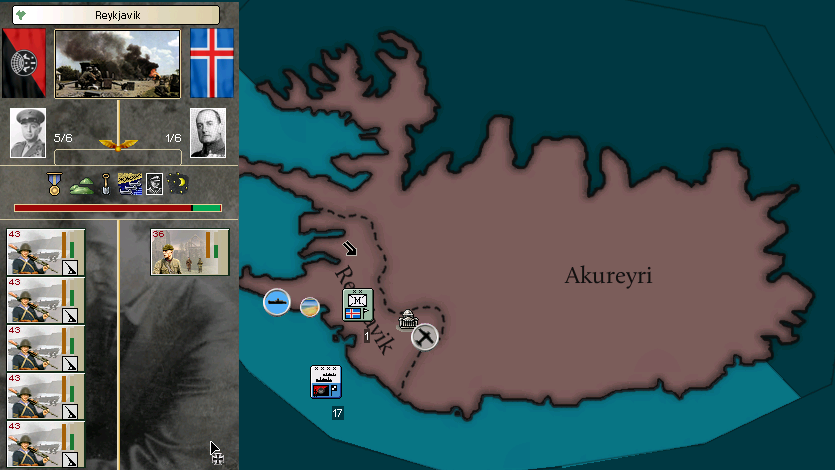 “You don’t have to be ashamed of it. Nobody oughta go looking for mortal danger. Either way, you should have joined the Marines if you were looking to show everyone how tough you are. They’re crazy bastards. Did you see they were up in Iceland?” 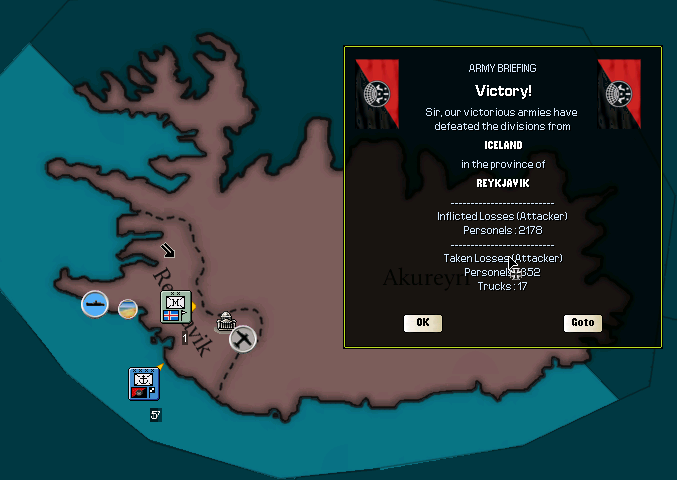 “Yeah, I read about that, but they said there was no resistance, so not really any fighting.” 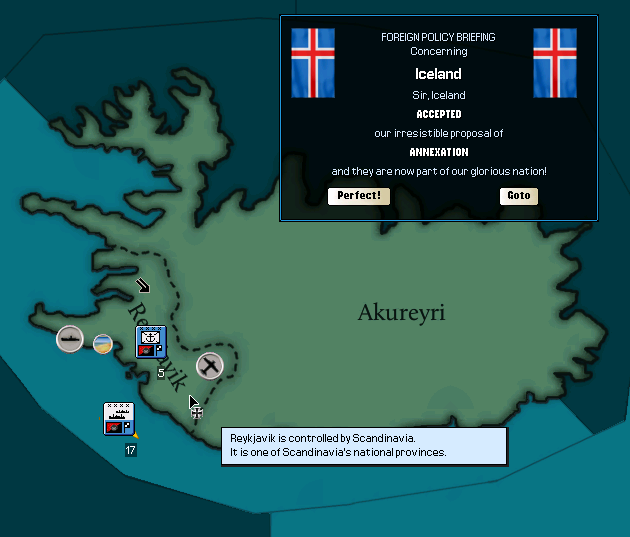 “Sandra, darlin’, you need to learn what the Army means when it says something. They said ‘virtually’ no resistance. That means resistance. Maybe only a hundred or so got killed.” Only a hundred or so. She had seen a man killed once, in ‘37. The Klan had come out of their hidey-holes in the woods and tried to shoot up a union meeting, but the Syndicate Guards had been tipped off and killed the whole lot of them. One of the Klan had tried to hide in the back yard of her mother’s house. His rustling had woken Sandra up, and she peered out the window in time to see one of the soldiers stab him with his bayonet. He hadn’t even tried to arrest the man. Just stabbed him in the chest. Even that wasn’t so bad. She had just seen two figures in the dark and heard the cry of pain, and that was it. It had to be so much worse to see your friend get killed, or to actually do the killing yourself. Sandra wasn’t a killer. Everyone around here boasted about the killing they’d done or would have done if they had gotten here in time to fight Germans. Sandra played along, but truth be told, she didn’t want to kill anyone. She had just wanted to get out of the factory. She didn’t want to be a part of anything where “only a hundred” people die. “How long you been with the army?” she asked the man. “Since ’39. I lived out in California and got in with some of the syndicalists. The government arrested me for some literature I wrote. Luckily, I knew one of the policemen, so he told me he’d let me go if I agreed to leave the Pacific States and never go back. So, they dropped me off in Arizona, and I drifted east to New York. Joined up when it looked about time to clear the Entente out of California. Since they had arrested a lot of my comrades out west, I figured I owed it to them to bust them out, so to speak.” 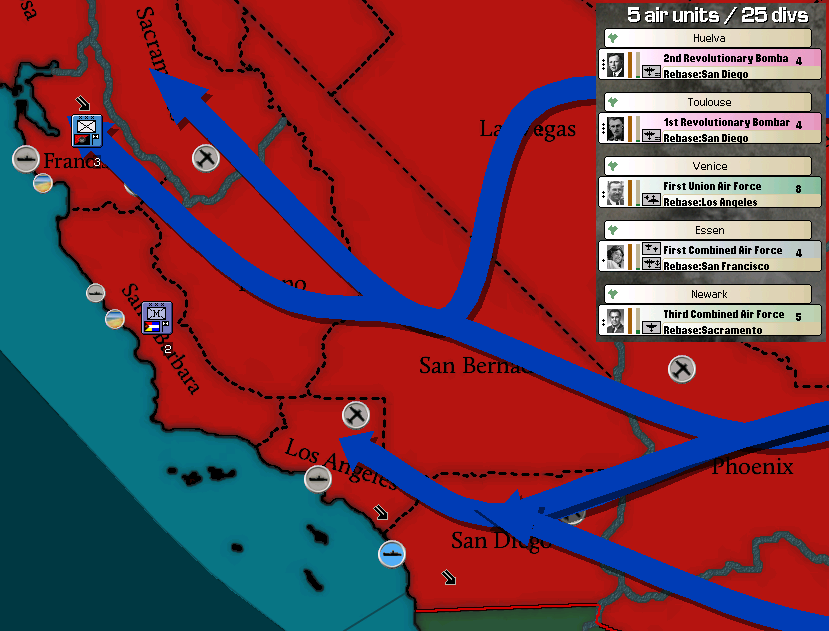 “What’s California like?” “Beautiful. I could talk about it for days and still have more to say. You really need to see it for yourself.” Sandra was silent a moment, then spoke up again. “Truth be told, mister, my main reason for joining the Army was because I wanted to get outta my town. Didn’t really care where I went. Didn’t think about the killing part until they put the gun in my hands. Ain’t seen much death and don’t really care to. I don’t really care to go back home when I’m out of the Army. I’ve heard nice things about California… that’s why I asked.” The man chuckled softly. “How many places other than home you’ve been, darlin’? Before joining the Army, I mean.” “Went to Knoxville… once.” “I wrote a song you might like. Would you like to hear it?” “I would.” ~*~*~*~ DECLASSIFIED 28/7/1990 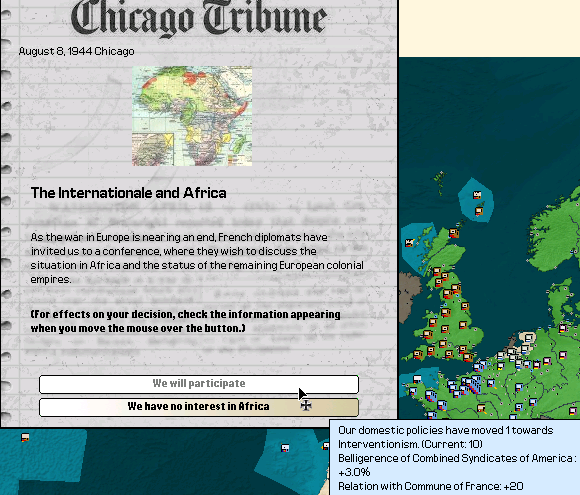 Curator’s Note: This recording was taken as part of the domestic intelligence service’s clandestine monitoring of the delegates attending the African Liberation Conference in August of 1944. It features a conversation between ASA PHILIP RANDOLPH, a delegate for the Combined Syndicates and DAVID KIRKWOOD, a delegate for the Union of Britain. KIRKWOOD: Ah, Mr. Randolph. It’s good to see you again. How have you been since Chicago? RANDOLPH: Well, Mr. Kirkwood, and yourself? KIRKWOOD: I’ve been better. Very hectic days, but it’s good to get out of Glasgow again. Is this your first time in Paris? 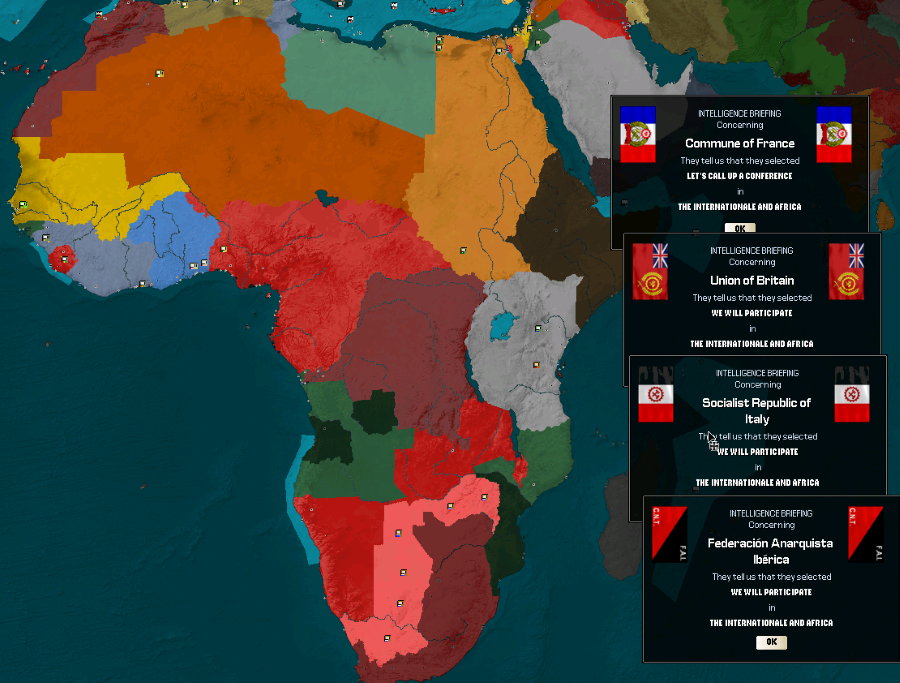 RANDOLPH: Yes, it’s quite lovely, though I do wonder why this needed to be in Paris. Why not have an African Conference in Africa? KIRKWOOD: I said the same thing! I was told it was so that they could get it over with sooner. Paris has the infrastructure already, they said, but I suspect the Commune just loves having everything in its backyard. RANDOLPH: This conference isn’t going to go well unless the Europeans are willing to let go of the privileges they once expected from Africa. I hope France and Britain understand that. KIRKWOOD: I hope America understands that too. You have far more influence in Africa than we do, Mr. Randolph. It’s up to you to set the example that you expect us to follow.    RANDOLPH: I’ve been working with the Chairman extensively on this. Rest assured, we will be setting the proper example. Tell me, David, do you expect any of the delegations to be trouble? Spain, Italy? 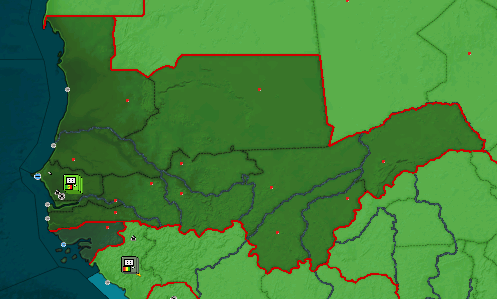 KIRKWOOD: Italy will follow France like a puppy. Spain will be trouble, not because of what they want to do but because of what they don’t want to do. They didn’t even want to be here, we had to drag them here. If we need to invade Portugal to end their colonial empire, then we need Spain to take responsibility for Portugal. But Spain doesn’t want to deal with that. They’re still too battered to want to take that on. RANDOLPH: We can surely offer them OAS divisions if that’ll mollify them. KIRKWOOD: Yes, Mr. Randolph, but Spain would have to deal with what is left over, remember. Smashing the enemy is the easy part. RANDOLPH: That is true. Tell me, Mr. Kirkwood. What is your country doing in Madagascar? 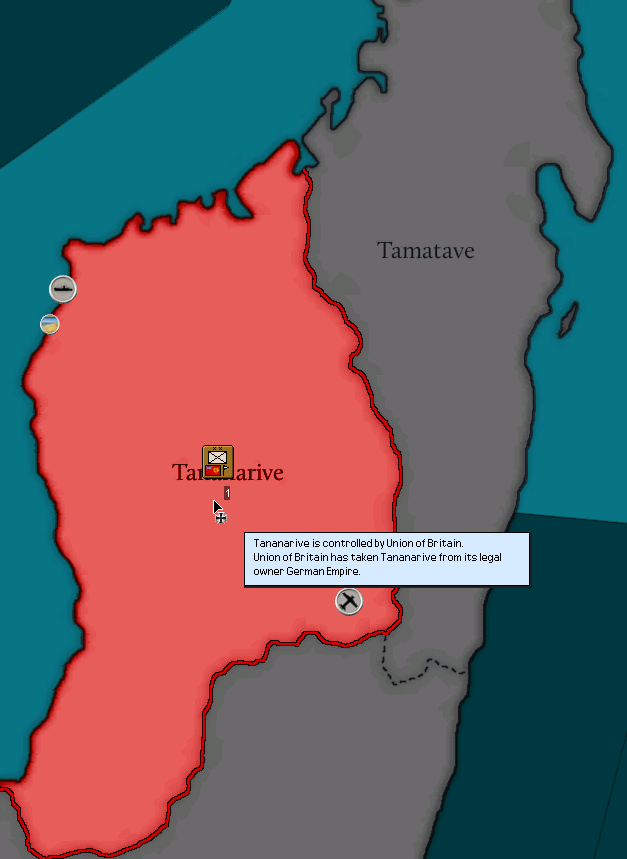 KIRKWOOD sighs. KIRKWOOD: Would you like the official answer or my opinion? RANDOLPH: Why not both? KIRKWOOD: Denying the German Empire a position from which to launch counter-revolutionary operations in East Africa. RANDOLPH: Okay, so what’s your take on it then? KIRKWOOD: Lawrence was taken aback by how harshly the East Africans rebuked his request to invade Ireland. I think he wants Madagascar as leverage against the Union. He thinks France rules the Continent and America rules Africa, leaving Britain with nothing. RANDOLPH: A sphere of influence, eh? Old habits die hard. KIRKWOOD: Indeed. Mr. Randolph, I don’t really know if this is appropriate to ask, but so long as we’re in private… a lot of us back home are trying to get Lawrence to step down, but we can’t get together a strong coalition to take his place. There’s been a lot of talk in Glasgow of a separation. Would America support that? RANDOLPH: What kind of separation? KIRKWOOD: The end of Britain as a single country. Scotland on its own again. I don’t know what Wales wishes to do but we’d all be under the European Union. Open borders and brotherhood, all of that. But we know that you Americans didn’t care for the Irish proposal. Most people in Scotland didn’t either. We could be a friend in the European Union. 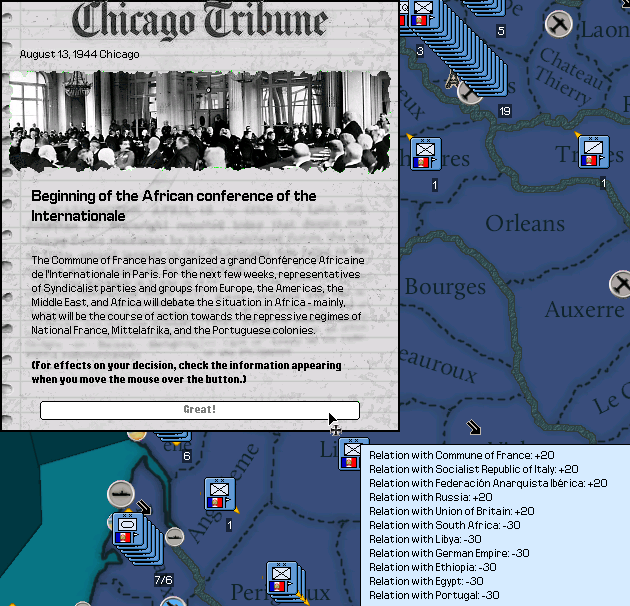 RANDOLPH: You’re asking a lot from a simple delegate, Mr. Kirkwood. I’m afraid I can’t say what my government will think. I’ll ask around though once I return from this conference. 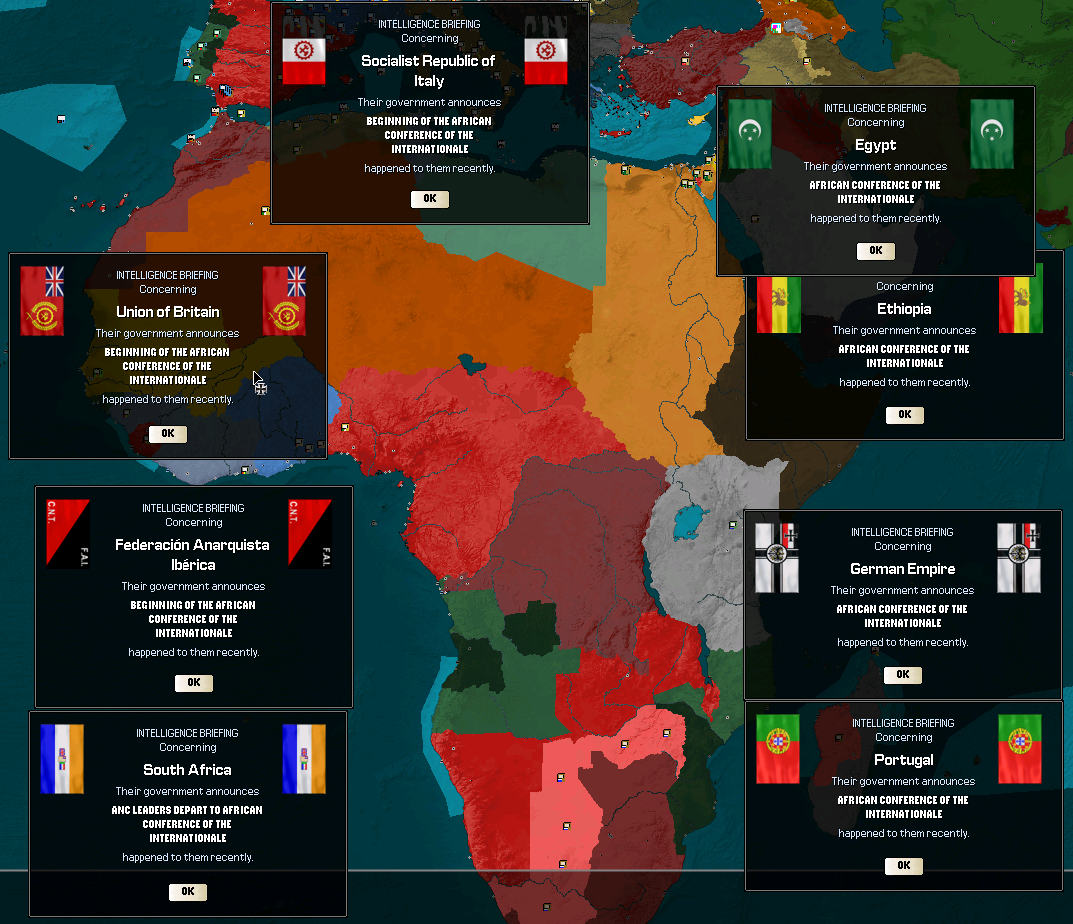 A LOUD KNOCKING KIRKWOOD: Come in! UNKNOWN person speaks. UNKNOWN: Comrade Kirkwood, I’ve been looking all over for you, I need you right away. KIRKWOOD: Ah, have the ANC leaders arrived? UNKNOWN: Umm… no, comrade. There’s a report from London you need to see immediately. KIRKWOOD: Ah, goddammit, what do they want now? UNKNOWN: It’s not that… it’s… KIRKWOOD: Mr. Randolph is a trusted friend. You can speak freely. UNKNOWN: Everything has gone wrong. ~*~*~*~ Sandra wiped tears from her eyes. She felt as though her crying should make her embarrassed but something about this man made her feel like he probably wouldn’t mind. Or that he’d take it as a compliment. That song had just spoken directly to her soul, it felt. She couldn’t help but cry a little. “That’s a good song, mister. The kind of song that gives me ideas.” The man smiled a toothy smile. “That’s the kind of song I love to write. Anyway, Sandra, it’s been a pleasure talking to you, but it’s time for me to get some sleep.” The man stood up and slung his guitar and rifle over his shoulder, clipped his canteen to his belt, and extended his hand towards her to offer a handshake. She took it. “I didn’t catch your name, mister.” Before he could speak, the horizon lit up as though a thousand suns were rising at once. A few moments later, a noise split Sandra’s ears and sent her to the floor of the watch tower, which shook but remained standing. She scrambled to her feet, accidentally using the guitar player’s head for balance, and looked out towards the source of the flash. The rising sun revealed dark plumes of smoke rising from Cherbourg harbor. With the ringing in her ears fading, she could hear shouting from the camp below. “What the hell was that?” “I don’t know, goddammit, but we better go help! Somebody get the ambulances moving!” Sandra took a deep breath. She didn’t want to do this, but she had signed up for it. Today she would have to see death.
|
|
|
|
Imperialists, in your internationale? Seems more likely than you would think!
|
|
|
|
Well this doesn't sound like a great development
|
|
|
|
Uh oh!
|
|
|
|
...Someone set us up the bomb??
|
|
|
|
Oh gently caress.
|
|
|
|
lol Britain is full of the pettiest dumbest babies if they decided to nuke France because they weren't allowed to invade Ireland. My God.
|
|
|
|
GunnerJ posted:lol Britain is full of the pettiest dumbest babies if they decided to nuke France because they weren't allowed to invade Ireland. My God. I wholly believe England could try going Full Juche over that rejection, but I'd be more than a little startled if they straight nuked an ally. e; That said we also don't know that it was a nuke, it could have been a fuel depot going up, a rogue German sub torpedoing the harbor, or something else. If it was the Bomb it could have been accident or sabotage, too. Regardless, whatever happened it's clearly a bad time. I suspect Scotland will suddenly be super eager to quit the UK if what happened was anything that London deserves blame for! Ms Adequate fucked around with this message at 04:27 on Mar 18, 2018 |
|
|
|
lol
|
|
|
|
Perfidious Albion!
|
|
|
|
Lol what did the Government of Iceland look like pre and post invasion?
|
|
|
|
lmao never trust an imperialist
|
|
|
|
Out of game, I think you're right. In it I suspect what we're seeing is the Lawrence coup chain playing out. Notice that there wasn't an event screen or anything for Ireland?
|
|
|
|
Even in this gay Syndicalist utopian world, Britain just can't stop being garbage.
I Love Annie May fucked around with this message at 10:07 on Mar 18, 2018 |
|
|
|
Deceitful Penguin posted:Lol what did the Government of Iceland look like pre and post invasion? Iceland had been sort of a client state of Canada after the event chain where they are a pawn between Canada and Beitsin.  Now they are a part of Scandinavia, and have no government of their own in game.
|
|
|
|
Ah, our singer from the introduction finally appears on scene!
|
|
|
|
Between HoI4 coming out and the KR devs saying they’re going to rework the Civil War I already feel pangs of nostalgia when this LP is updated especially since it convinced me to buy DH
|
|
|
|
I'm astounded they are still working on the DH mod and are doing the Italy changes in it
|
|
|
|
Plutonis posted:I'm astounded they are still working on the DH mod and are doing the Italy changes in it Yeah some of the K4 stuff was a little rough since it felt like they were trying to bolt DH mechanics on top but the new expansion seems almost tailor made for KR
|
|
|
|
Chapter Three: London Calling (Late August – September 1944) Excerpt from Albion Alone: A British History 1944-1988, by Gerald Baker The plot was clearly not intended to launch as early as it did, and we may never know for sure why the conspirators jumped the gun. The rejection of the Irish proposal certainly had angered Lawrence and the Scottish independence movement was gathering steam, but it surely would not result in a separation before the end of 1944. A popular theory is that his supporters were beginning to turn on one another, so he launched the plot early to keep one from defecting and ruining the entire scheme.  Either way, in the night hours of August 26, 1944, the counter-revolutionaries struck. Royalist cells activated all over Britain and attacked local centers of power. The Republican Army was based in two staging areas for the planned invasion of Ireland: Cornwall and Scotland. Lawrence had spent the last year filling the ranks of Republican Army division commanders with loyalists. When the plot launched, the commanders of both the Northern and Southern Army Groups moved to raise the royalist banner. They mostly succeeded in Cornwall, with a few mutinous battalions being destroyed, but Scotland was a different story altogether.  The plotters planned to secure control of the Army before announcing the reformation of the United Kingdom. In Scotland, these two things occurred in reverse. Defensive militias under direct union control caught wind of the plot before the royalists in the Army got the signal to move. The militias, supported by the Republican Marines and the Navy, moved to surround the barracks of the Army around Glasgow, and presented an ultimatum. The divisions in Scotland could either mutiny and provide their treasonous generals for summary execution, or they could be bombarded by the Republican Navy. All divisions in Scotland chose the former option. Seven generals were executed by firing squad.  As the sun rose on the day of August 26, the royalists found themselves in control of Western England. Their forces were bolstered by exiles from Australasia and Canada who had taken up a Republican offer to settle in Britain. Most of the immigrants were socialists, but many were royalist agents given the identities of imprisoned socialists from their homelands. This allowed them to enter the country based off British lists of union organizers and syndicalists who should be permitted to enter.  The result was a strong Royalist Army in control of Western England and a strong Republican Army in full control of Scotland. Ad hoc workers militias retained control of Southeast England. Most critically, London had held. Thousands of Londoners had woken to the sounds of gunfire and mobilized to free the delegates of the Trade Union Congress being held hostage in the Parliament building. The Royalists in London fought long enough to buy time for General Lawrence to escape to Plymouth before being overwhelmed by the locals. Despite the failures in Scotland and London, the Royalists had a lot to be happy about. They had control of defensible terrain in Cornwall, Devon and Wales, and the flatlands of England proper were barely defended.  Lawrence had always planned for the plot to take place after American forces had departed Europe. His plan to slow the arrival of French reinforcements was comprised of two elements. First, he intended to control every major port in southern England, thus denying reinforcements from northern France ports to disembark in. The spirited resistance of dockworkers in Portsmouth, Norwich and Dover had prevented those ports from falling into Royalist hands at first. However, they couldn’t hold Portsmouth against trained infantry units who would come to the city six days after the initial coup. The enemy was bearing down quickly on Dover as well. The workers militia of London, numbering well over fifteen thousand after the first week, had set up defensive positions, ready to hold the city against the expected assault, but they were vastly outnumbered and outgunned by the approaching Royalists, and they were too disorganized to try and move south and defend the port of Dover. The other part of the plan was to sabotage Continental ports that could handle loading thousands of troops at once. Stockpiles of ammunition being returned to Britain were purposely scheduled by the plotters to depart major French ports, as well as the port of Antwerp, on the morning of August 26. Royalist agents on the ships containing this ammunition would disable and set fire to the ships, creating a massive hazard that would delay any attempt at rapid reinforcement long enough for the Army to defeat any militias. Two things had gone wrong with this plan, firstly, the Northern Army Group had stayed loyal to the Republic.  The other thing that went wrong was the miscalculation of the Royalist agent in Cherbourg. The plan in Cherbourg was to disable the ship in the entrance to the harbor and then set fire to it in such a fashion that the fire would approach the ammunition stores but not actually ignite them right away. The firefighting effort and the unwillingness of the Internationale to have any ships go near a vessel that might explode at any moment. Theoretically, this would effectively shut down the port for the needed duration and allow the agent time to get away. The agent was evidently unaware that some crates of ammunition were stored in the section he set the fire in. The ship’s entire ammunition store went up almost immediately after the fire was set, causing an explosion so powerful that it was heard as far away as Rennes and Exeter. This caused significant damage to the city and the harbor, but the agent failed to achieve his goal. The ship was blown apart so completely that no hulk remained to actually block the harbor. Pieces of the ship rained all over the city and caused hundreds of casualties, but the harbor itself was mostly operational within three days.  Republican Navy commanders loyal to the Republic were present in Paris for the ongoing African Liberation Conference, along with American military leaders and the French general staff. The conference was ended prematurely and the military leaders in the city formed a unified command in Paris for the purposes of defending the Republicans in Britain. While Lawrence may have hoped that the presence of some of his domestic rivals at the Conference would make his plot easier back in Britain, it turned out to be fortuitous for the Internationale. American armies that were packed up and ready to go back home were instead sent to Cherbourg.  The first American reinforcements departed Cherbourg for Dover on September 9th, just two weeks after the Royalists attacked.  It was, suitably, the Transatlantic Expeditionary Force, the famous corps which had been formed as a marriage between American worker militias and a division of British volunteers in the first weeks of the Second American Revolution. General Maurice Rose, one of the most decorated generals of the conflicts with Germany and Canada, led his exhausted troops into Dover. The units had not been in a fighting mode for months and were exhausted by the ordeal of working day and night to load trains and ships in their mad dash to the north of France. There had been reports of attempted mutiny when some of the American divisions were informed they would be sent into battle again. After months of peace and a glorious homecoming only weeks away, the thought of more war was deeply upsetting to most American soldiers. The exception was in the TAEF. This was because of one of its member divisions: the legendary Colliers division of British veterans who had served alongside Americans for almost eight years on three continents. While British soldiers made up less than 10% of the TAEF, the entire corps felt an internationalist spirit only matched by their Franco-American comrades in the Benjamin Franklin Corps. The Colliers’ experience and professionalism had been the deciding factor in the defense of Roanoke in 1936, a pivotal moment which kept the Union State from gaining an advantage in Virginia. Now the Colliers’ homeland was the one under threat, and the Americans in the TAEF were eager to repay the favor done eight years prior.  The Republican Army was holding firm in both Manchester and Liverpool. With the situation around London stabilized by September 11, the Internationale command sent the second batch of reinforcements to the still open port of Liverpool to hem in the Royalists from the north.  The Abraham Lincoln Corps, under the leadership of Harry Haywood, was just as exhausted as the TAEF when they docked in Liverpool. Fortunately, their mere appearance was enough to make the Royalists retreat to Birmingham and set up defensive positions.  Lawrence’s plan, like the saying goes, had not survived contact with the enemy. The failure to gain control of the northern divisions had been unexpected, and the arrival of American reinforcements within two weeks had thrown a major wrench into his designs. The best option available to him was to separate London from Scotland, the strongest base of Republican support. The Royalists attacked northwest, seizing Oxford, Luton, Grimsby and Lincoln, threatening Hull and controlling the northern approaches to London, and severing the land connection between the northern and southern Republican loyalists.  A third group of American reinforcements were dispatched to Norwich, to prevent London from being enveloped and to take back the East Midlands.  With the East Midlands under attack from north and south, the Royalists could not hold their gains. Lincoln was recaptured on September 18.  With three large American corps present in England, the Royalists were running out of options. The feeling of the Royalists at this critical juncture can be best summarized in the journal of General George Giffard, a Royalist commander who had the following to say when his position in Cambridge came under heavy assault by a superior American force: “It was a tremendous feeling to liberate the great universities of England, but it has become eminently clear that we will not be able to hold them for long, perhaps only a few weeks. That is what this entire scheme has come to feel like: we wanted to bring back what the Empire used to feel like, and now that we’ve had the chance to play pretend, reality is setting back in. This was folly. The French and Americans cannot be resisted. Nobody will say so out loud, especially not to Lawrence, but I fear all we have left to gain is an honorable death for King and Country.”  Giffard was wrong. He only held Cambridge for one day after he wrote those words, and Oxford fell two days later.  As the end of September approached, the Internationale had established a solid front line for the first time in the month since the British Civil War had begun. While Northern Wales had been taken by the Royalists, fifty-four American and twenty-five Republican divisions manned a line that stretched from Liverpool to Brighton. The Royalists had been contained.
|
|
|
|
One of the more realistic results I've ever seen for Lawrence's coup - of course, maybe I shouldn't speak too soon.
|
|
|
|
Erwin the German posted:One of the more realistic results I've ever seen for Lawrence's coup - of course, maybe I shouldn't speak too soon. CSM, our LPer, reveals himself to be a royalist and declares the entire LP non-canon, revealing the true LP: This Land is the King's Land, And You Just Live on It
|
|
|
|
Aha! I was right! Big ammo explosion!
|
|
|
|
Who's in charge of the UoB now?
|
|
|
|
Kavak posted:Who's in charge of the UoB now? Honestly, I don't know at this juncture and I don't have the saves anymore. There's an event soon that chooses new leadership though.
|
|
|
|
Something that occurred to me while I was rereading for kicks--what would be the state of DC in this future? DC was built as the capital, it doesn't have any other native resources or industry. It "makes paper", as someone put it. If the capital is moved to Chicago... what happens? Apart from the museums, what's the city got left?
|
|
|
|
Dismantled and given to other jurisdictions (As most of it should be IRL). As for the buildings, who knows. Is there precedent for this in modern revolutions? Usually you take over the same capital or you have a bunch of palaces and crap you can turn into museums and maybe hotels.
|
|
|
|
Maybe turn it into a Colonial Williamsburg-type deal? DC would still maintain relevance for several years after the capital moves to Chicago, if for no other reason than the CSA would have to wait until the apparatus of state (at least, the parts that still exist and are integrated into the CSA's structure) is logistically able to move. See the Bonn/Berlin relationship after the fall of the Wall. There are -still- some German federal agencies based in or operating chiefly out of Bonn, and Berlin's been the capital of reunified Germany for nearly 30 years now. The city would likely still retain its relevance on an academic front too, as I kinda doubt prestigious universities like Georgetown and GW would just move to Chicago. I wanna say it was touched upon in Turtledove's Southern Victory series, where the capital of the United States is moved to Philadelphia after the Civil War ends with an independent South. DC becomes sort of a sleepy ex-government town that still holds symbolic value and a bunch of museums, but not much else until it's basically destroyed in two World Wars. Drone fucked around with this message at 08:40 on Mar 19, 2018 |
|
|
|
|
I didn't know there's an event chain that leads to a civil war between the UK and the Union of Britain, it never happened in any of my games.
|
|
|
|

|
| # ? Apr 26, 2024 19:08 |
|
I Love Annie May posted:I didn't know there's an event chain that leads to a civil war between the UK and the Union of Britain, it never happened in any of my games. Lawrence has to be in charge and pick the right option.
|
|
|
































